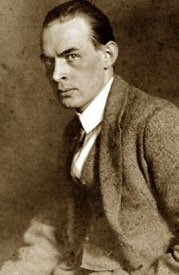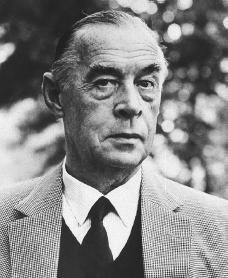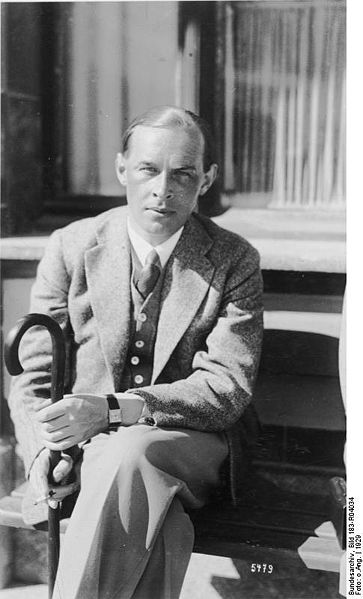<Back to Index>
- Biologist Julian Sorell Huxley, 1887
- Author Erich Maria Remarque, 1898
- Field Marshal of the Luftwaffe Robert Ritter von Greim, 1892
PAGE SPONSOR



Erich Maria Remarque (born Erich Paul Remark; 22 June 1898 – 25 September 1970) was a German author, most known for his anti-war novel All Quiet on the Western Front.
Erich Paul Remark was born on 22 June 1898 in a working class family in the German city of Osnabrück, to Peter Franz Remark (b. 14 June 1867, Kaiserswerth) and Anna Maria (née Stallknecht; born 21 November 1871, Katernberg). At the age of 16 he made his first attempts at writing: essays, poems, and the beginnings of a novel that was finished later and published in 1920 as The Dream Room (Die Traumbude).
At 18, Remarque was conscripted into the army. On 12 June 1917, he was transferred to the Western Front, 2nd Company, Reserves, Field Depot of the 2nd Guards Reserve Division at Hem-Lenglet. On 26 June he was posted to the 15th Reserve Infantry Regiment, 2nd Company of Trench Battalion Bethe, and was stationed between Torhout and Houthulst. On 31 July he was wounded by shrapnel in the left leg, right arm and neck, and was repatriated to an army hospital in Germany where he spent the rest of the war.
In
1924, he started to write his last name as Remarque, which had been the
family name until his grandfather changed it to Remark in the 19th
century. He had already been using the middle name "Maria" since
November 1922. He worked at a number of different jobs, including
librarian, businessman, teacher, journalist and editor. His first paid
writing job was as a technical writer for the Continental Rubber Company, a German tire manufacturer. In 1927 Remarque made a second literary start with the novel Station at the Horizon (Station am Horizont),
which was serialized in the sports journal "Sport im Bild" for which
Remarque was working. It was published in book form only in 1998. His
best known work, All Quiet on the Western Front (Im Westen nichts Neues) was written in a few months in 1927, but Remarque was not immediately able to find a publisher. The novel, published in 1929, described the experiences of German soldiers during World War I. A number of similar works followed; in simple, emotive language they described wartime and the postwar years. On May 10th 1933, the Nazis, instigated by the then Nazi propaganda minister Joseph Goebbels
banned
and publicly burned Remarque's works and produced propaganda claiming
that he was a descendant of French Jews and that his real last name was
Kramer, a Jewish sounding name, and his original name spelled
backwards. This is still cited in some biographies despite the complete
lack of evidence. The Nazis also claimed, falsely, that Remarque hadn't
done active service during World War I. In
1943 the Nazis arrested his sister, Elfriede Scholz, who had stayed
behind in Germany with her husband and two children. After a short
trial in the "Volksgerichtshof"
(Hitler's extra constitutional "People's Court") she was found guilty
of "undermining morale" for stating that she considered the war lost.
Court President Roland Freisler declared, "Ihr Bruder ist uns leider entwischt — Sie aber werden uns nicht entwischen" ("Your brother has unfortunately escaped us — you, however, will not escape us"). Scholz was guillotined on 16 December 1943. His next novel, Three Comrades (Drei Kameraden), spans the years of the Weimar Republic, from the hyperinflation of 1923 to the end of the decade. Remarque's fourth novel, Flotsam (in German titled Liebe deinen Nächsten, or Love Thy Neighbour), first appeared in a serial version in English translation in Collier's magazine
in 1939, and Remarque spent another year revising the text for its book
publication in 1941, both in English and German. His next novel, Arch of Triumph, first published in 1945 in English, and the next year in German as Arc de Triomphe, was another instant best seller and reached worldwide sales of nearly five million. In 1948 Remarque returned to Switzerland, where he spent the rest of his life. There was a gap of seven years — a long silence for Remarque — between Arch of Triumph and his next work, Spark of Life (Der Funke Leben), which appeared both in German and in English in 1952. While he was writing The Spark of Life Remarque was also working on a novel, Zeit zu leben und Zeit zu sterben (Time to Live and Time to Die). It was published first in English translation in 1954 with the not-quite-literal title A Time to Love and a Time to Die. In 1958, Douglas Sirk directed the film A Time to Love and a Time to Die in Germany, based on Remarque's novel. Remarque made a cameo appearance in the film in the role of the professor. In 1955 Remarque wrote the screenplay for an Austrian movie, The Last Act (Der letzte Akt), about Hitler's final days in the bunker of the Reich Chancellery in Berlin, which was based on the book Ten Days to Die (1950) by Michael Musmanno. In 1956 Remarque wrote a drama for the stage, Full Circle (Die letzte Station), which played successfully in both Germany and on Broadway. An English translation was published in 1974. Heaven Has No Favorites was serialized (as Borrowed Life) in 1959 before appearing as a book in 1961 and was made into the 1977 movie Bobby Deerfield. The Night in Lisbon (Die Nacht von Lissabon), published in 1962 is the last work Remarque finished. The novel sold
some 900,000 copies in Germany and was a modest best seller abroad as
well. His first marriage was to the actress Ilse Jutta Zambona in 1925. Their
marriage was stormy and unfaithful on both sides. After a divorce, they
remarried each other in 1938. In 1931, after finishing The Road Back (Der Weg zurück) Remarque
left Germany. He bought a villa in Porto Ronco in Switzerland and lived
both there and in France until 1939, when he left Europe for the United
States of America with his wife. They became naturalized citizens of the United States in 1947. They divorced again on May 20, 1957, this time for good. Remarque married actress Paulette Goddard the next year (1958). Ilse Remarque died on June 25, 1975. Remarque and Goddard remained married until his death in Locarno on 25 September 1970, aged 72. He was interred in the Ronco cemetery in Ronco, Ticino, Switzerland. Goddard died in 1990 and was interred next to her husband. She left a bequest of $20 million to New York University to
fund an institute for European studies, which is named in honor of
Remarque. The first Director of The Remarque Institute was Professor Tony Judt. Remarque's papers are housed at NYU's Fales Library.